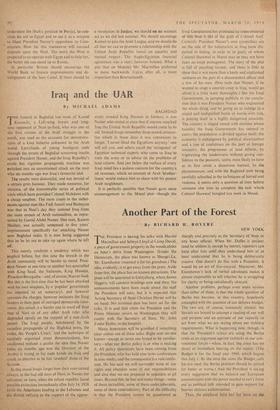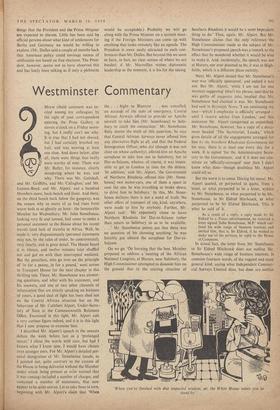Another Part of the Forest
By RICHARD H. ROVERE NEW YORK TliE President is having his talks with Harold Macmillan and Selwyn Lloyd at Camp David, a piece of government property in the woods about an hour's drive from Washington. (Under the Democrats, the place was known as Shangri-La. Mr. Eisenhower renamed it for his grandson.) The idea, evidently, is to get away from the press. Aside from this, the place has no known attractions. The press will be quartered in Gettysburg, where James Hagerty will conduct briefings now and then. No announcements have been made about the staff the President will take, but it is expected that Acting Secretary of State Christian Herter will be on hand. No terminal date has been .set for the talks. It is said that when the President and the Prime Minister return to Washington. they will confer with the Secretary of State, Mr. John Foster Dulles, in the hospital.
Many Americans will be gratified if something clear comes out of these talks. Right now no one' knows—except in terms too broad to be satisfac- tory—what our Berlin policy is or who is making it. All policy statements have been coming from the President, who has held nine news conferences in nine weeks, and the consequence is a vast confu- sion. He has said we will surrender none of our rights and abandon none of our responsibilities and also that we are prepared to negotiate at all times. Beyond this, he has said many things—some of them, incredible, some of them undecipherable, some of them contradictory. Part of the difficulty is that the President cannot be questioned as sharply and precisely as the Secretary of State or any lesser official. When Mr. Dulles is unclear (and he seldom is, except by intent), reporters can keep after him until they understand him or at least understand that he is being deliberately evasive. One doesn't do this with a President; it would be an act of /e8e-moieste. Moreover, Mr. Eisenhower's lack of verbal adroitness makes it almost impossible to tell whether he is struggling for clarity or being calculatedly obscure.
Another problem, perhaps even more serious than either of these, is that the whole question of Berlin has become, in this country, hopelessly entangled with the question of defence budget. The two are, of course, intimately related; the Soviets are bound to attempt a reading of our will and purpose and an estimate of our Capacity to act from what we are saying about our military requirements. What is happening now, though, is that the President's critics are using the Berlin crisis as an argument against cutbacks in our con- ventional forces—when, in fact, the crisis has no direct or immediate bearing on the matter. (The Budget is for the fiscal yea! 1960, which begins this July I. By the time the sums the Budget calls for are used, the Berlin problem should be settled for better or worse.) And the President is taking every suggestion that we balance our European commitments with the power needed to carry them out as political talk intended to gain support for heavier defence authorisation.
Thus, the emphasis here ha ; not been on the things that the President and the Prime Min,ister are expected to discuss. Little has been said by official persons about what kind of settlements for Berlin and Germany we would be willing to explore. (Mr. Dulles said a couple of months back that American policy could envisage means of unification not based on free elections. The Presi-. dent, however, seems not to have observed this and has lately been talking as if only a plebiscite would be acceptable.) Probably we will go along with the Prime Minister on a summit meet- ing if the Foreign Ministers can come up with anything that looks remotely like an agenda. The President is more easily attracted to such con- ferences than Mr. Dulles. But beyond this we seem to have, in fact, no clear notion of where we are headed; if Mr. Macmillan wishes diplomatic leadership at the moment, it is his for the taking.



































 Previous page
Previous page